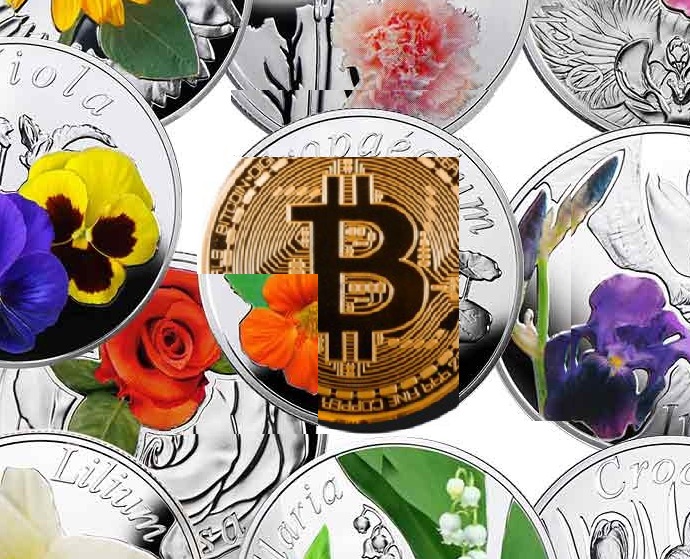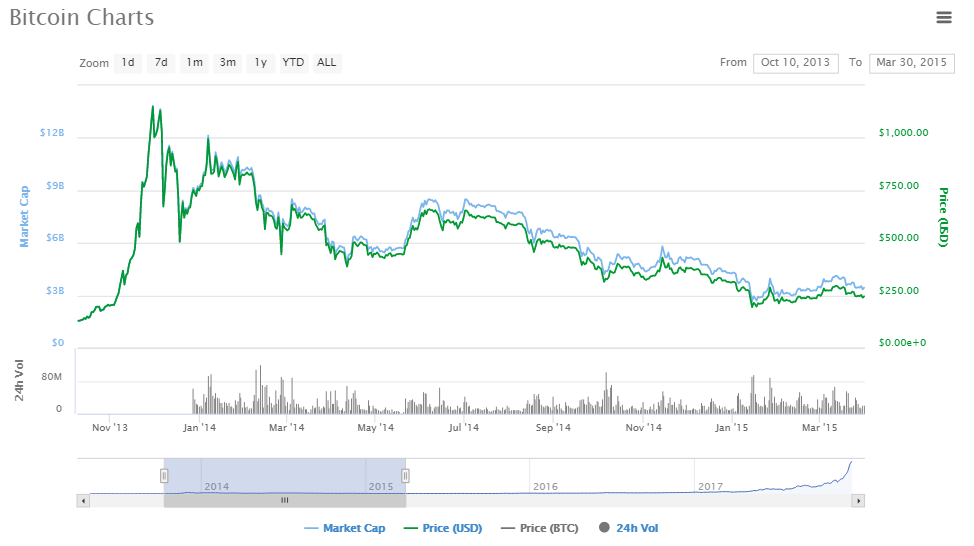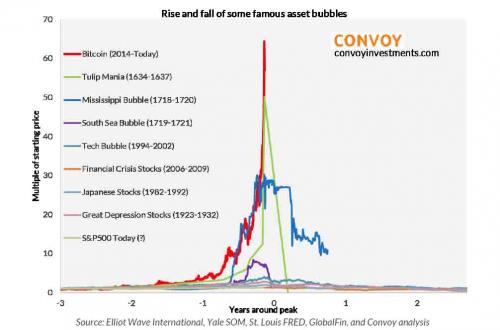Is Bitcoin A (Tulip) Bubble? History's Most Exaggerated Non-Bubble (Even Tulip's Weren't Tulips)

Whenever Bitcoin experiences a run in price, the bubble callers come out of the woodwork. You'll have to forgive them, as they've been "right"a few times. (Note: definition of "right" open to interpretation)

However, their accuracy can be mostly credited to (literal) "dumb" luck, as neither Bitcoin, nor tulips themselves, actually bear any resemblance to what we know as "Dutch Tulip Mania."
Perhaps you've seen this chart:

For those unaware, perhaps the most famous bubble in history is the "Dutch Tulip Mania". The mainstream knowledge has it that such a furious bidding war broke out for tulips in Amsterdam in the late 1600s that it made most modern stock market bubbles look like a bunny hill. Supposedly, the truly insane delusion of crowds bid a single rare tulip bulb to a price in excess of a luxurious Dutch estate, and men were thrown in jail for the accidental destruction of a flower.
Of course, none of that is true in any way. Here are 3 generally unknown reasons why Tulip "fever" was bullshit.

Demand for tulips was already at a cyclical high. The "Thirty Years War" (1618-1648) had taken a vast toll on the Dutch people. Wikipedia notes that the war "ranks with the worst famines and plagues as the greatest medical catastrophe in modern European history" with "population loss in central European states "ranging up to 50%". In other words, there was already high demand for Tulips and every reason to assume that would continue for the foreseeable future
The top of the bubble, or the point that everyone makes their "Tulips went up XXX%" calculations from, is a lie. The "trade" marking the top of the bubble, the one everyone uses to calculate the total bubble percentage? Never happened. A careful perusal of existing Dutch records show that not even ONE SINGLE bankruptcy was recorded or attributed to the "bursting of the Tulip Bubble".
Most Tulip contracts had an opt-out clause. This means that, effectively, you could pay money to speculate with limited downside. Consider this example: You are watching the tulip market rapidly appreciate. A market maker allows you to buy the option to receive delivery of $100 in Tulips at today's value in 1-month, for $100, with a delightful catch – for a mere $1, you can reject delivery in one-month and destroy the contract. Sound like limited downside and extreme upside? Well, that's exactly what it is, and this is why so many tulip contracts traded.

In other words, tulips were not a bubble. They were a (mostly) rational response by market actors to unusual demand outside normal statistical variance.
So the next time that you hear someone call Bitcoin a Tulip, go ahead and tell them you're fine with that. Bitcoin being a rational trade with vastly outsized risk relative to the upside is a good thing for all of us.
Then walk away, because they won't get it, unless they, too, were bored enough to write a paper on Tulips when studying for their PhD in economics.
If you have any additions or errata for this post, please let me know! I will see that they are voted to the top of the comments, and will make the appropriate edits (if possible).

We also have a Radio Station! (click me)
...and a 5000+ active user Discord Chat Server! (click me)

Sources: My Economics Thesis, Wikipedia, Smithsonian Magazine
Copyright: FirstCoinCompany.com, Bouq.com
Very Interesting. I suspect central bank funny money might be the actual bubble.
The US$ is probably the largest bubble that this world has ever known. It's distorting everything else to the point where nothing makes sense.
Excellent and relevant discussion, certainly the given topic is hot subject, let me add a little color to an already beautiful piece.... I like to see economics as both social and mathematical, the social part we have done a good job over the years of building different school of thought from Keynesian to Austrian but the mathematical part still mystify us... I believe that where Bitcoin and blockchain technology allows us to understand whats working from whats not... As long as the participant behave by consensus the given price of Bitcoin supports the given economics of the day, it cannot be compared to the mania of the Dutch Tulips where participant acted in their own self-interest often eroding the given market economics, such mania always pops when self-interest cannot find market support...
Good to have you back Lex! More arguments for the the non-believers who still trust in having all their savings in a bank account!
Thanks Jon! I've had this post idea sitting, unfinished, for 5 months. Time to finally get it out there.
By technical point of view, limited supply of 21 million in bitcoin, exponential growth seems reasonable. But trading it as if it's in a bubble makes you to be more wary of your capital. I truly believe in the technology of bitcoin and blockchain, but throught out history every new groundbreaking tech will always underwent bubble of some sort to achieve massive adoption. So it's always wise to trade with moderation and not greed. And suprisingly I posted about the same topic too ahaha.
Great points! I'm not sure if BTC would surprise me more at $1000 or $100,000. It's anyone's guess at this point.
Take-off? Media-attention? New Paradigm?
I think we are at Greed stage, Arrival of CME and CBOE to the scene takes us from 300 billion market cap to the now almost 600 million cap in almost a month! Delusional stage will soon set in, dot com bubble burst at 9.6 trillion. We are now approaching 1 trillion.. Becareful guys. Everyone hope bitcoin will only go higher, but no what goes up must come down. So only invest the money you're willing to lose. Save some money aside to buy when the bubble burst. You might be the crypto Warren Buffet.
Ripple would appear to be clearly confirming your observations:
2 Ripple $82,453,945,458 $2.13 $6,622,780,000 38,739,144,847 XRP *
I like this Lexi... this is a ninja chop to the back of the neck of the bears... Since I started with cryptos I get at least one msg or phone call a month of somebody trying to warn me that I'm going to loose my ass and that I should read about the Tulip Mania to know what I'm walking towards...
So this is like a ninja chop that is going to be in my batman utility belt...
Hey, it could certainly still crash hard! It's done it before.
But, the tulip analogy is really overdone. I don't like seeing it at "reputable" financial websites.
Wasn't the demand for Tulips due to the greatest world power at the time, the Ottoman Sultanate, designating the Tulip as the imperial flower? The so-called Tulip era of Suleiman's court gave rise to the French nobility attempting to emulate the Ottomans, which later spread to the nouveau riche copying their betters.
The Tulip mania as a process continues to be instructive, as the traded commodity became tulip bulb, not even the flower itself. The folly of the mania is not the bubble itself, but the fascinating phenomena of men mortgaging futures, or rather potentials (i.e. bulbs), for the present. In essence, the Tulip futures market, as well as any commodity trading scheme, is a transfer of wealth from the future to the present.
It is interesting that the fleeting preference of one Ottoman Turk, a perceived sworn enemy to Christians, would so influence Christendom nearly a century after his death.
I wasn't aware of this being one of the larger factors in this bubble, though I have heard reference to it.
That's a good overview. I would also add that back then people were very much poorer, which means, there was a lot less capital floating around. On the height of the mania one top tulip cost around 30k Gulden (->Wiki) while the average annual income was 150 Gulden.
Compared to the global average annual income of about 10k $ that would mean a price of 2 million $ for one Bitcoin. That's hardly possible, since the overall market cap would be at 40 trillion $. It would literally eat away all the capital in the world. I'd say the breaking point for the global economy (= an uncontrolled contraction) would be reached at maybe a quarter of that price.
"On the height of the mania one top tulip cost around 30k Gulden"
This is precisely the misinformation I literally wrote this article to dispel:
"The "trade" marking the top of the bubble, the one everyone uses to calculate the total bubble percentage? Never happened."
Your market cap numbers explain why this number was always such patent nonsense.
I got that number straight from the German Wiki article about the Tulipmania:
translate
Although these specific tulips never made it over the counter, it is enough for a rough estimate of the entire mess, as I think. Even if the "stable" peak price was just 10,000 Gulden, the market "futures" were pointing upwards, not to mention that this price still would be equal to far more than half a million Dollar.
My whole point here is that the entire Tulip situation was over-stated.
Wikipedia is not an acceptable sole-source when specifically discussing matters accused of being incorrectly hyped up in history. It will have exactly the same faults. You need more primary sources. Preferably, not Dutch Calvinists.
"there was an offer"
You can't price markets by offers. Offers are not a trade. Hell, you shouldn't even price them by a single trade.
"“There weren’t that many people involved and the economic repercussions were pretty minor,” Goldgar says."
...
"So if tulipmania wasn’t actually a calamity, why was it made out to be one? We have tetchy Christian moralists to blame for that. With great wealth comes great social anxiety, or as historian Simon Schama writes in The Embarrassment of Riches: An Interpretation of Dutch Culture in the Golden Age, “The prodigious quality of their success went to their heads, but it also made them a bit queasy.” All the outlandish stories of economic ruin, of an innocent sailor thrown in prison for eating a tulip bulb, of chimney sweeps wading into the market in hopes of striking it rich—those come from propaganda pamphlets published by Dutch Calvinists worried that the tulip-propelled consumerism boom would lead to societal decay. Their insistence that such great wealth was ungodly has even stayed with us to this day."
https://www.smithsonianmag.com/history/there-never-was-real-tulip-fever-180964915/
I don't know if I should trust such an US-imperialist free-market propaganda institution like the Smithsonian;-)
Ah, well, you may have a point there. I mostly just use them for the minerals section of the Natural History Museum. Perhaps they are a biased source as well.
It's probably both relatively true.
Looking at the size of the bubble compared to the general wealth and economic situation it must have been huge, especially since it was a new mass phenomenon. But then again, one must never forget that money is switching hands despite the price break-down and while one half loses everything, the other wins everything.
Economics is all about capital flow and trust and the repercussions of such a bursting bubble are the more severe, the less the winners of the burst trust the economy, because they hold their capital back from changing hands. If - and I guess this was the case in the Netherlands - the trust is high and the winners of the situation have confidence into the future, they simply reinvest the money they've just won in the bubble lottery. Then, the economic consequences are maybe visible, but limited.
My guess would be that the tulips have been traded between professionals who didn't take their gains and ran, but acted professionally and reinvested. I would say that if it had been a market driven by amateurs, it might have ended with more damage.
Ultimately, much like the current market cap of cryptocurrencies, the "market cap" of tulips was probably grossly overexaggerated by ignoring the effects of the order book vs. peak price:
https://steemit.com/taxes/@lexiconical/valuing-steem-rewards-as-taxable-income-is-a-vast-overstatement-of-tax-liability-part-2-the-thin-order-book-and-flash-crashes
The story is what most people buy into, stupid FACTS get in the way.
Darn those Dutch Calvinists!
https://www.smithsonianmag.com/history/there-never-was-real-tulip-fever-180964915/
I'm Dutch and i can asure you, we HODL tulips!!! :D
Thank you for this critical modern update.
I think of bitcoin more as a hibiscus
Is that because having large amounts of it will get you "Lei'd"?